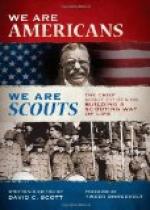We met Gen. Kerney, who was glad to see us. He said, “Boys, where in the name of common sense are you going to?”
We explained to him in a few words our business. After hearing our plans the Gen. said, “I am certainly glad to know that someone will take hold of this thing, for I am sure that there will be more emigrants massacred this year than has ever been in any other. I will tell you why I think so. All the Indians from here to the Sierra-Nevada mountains are in the war-path; in the second place the emigrants who are coming from the east have no idea what they have to contend with, and I dread the consequences.”
While this conversation was taking place a soldier rode in that had been on picket duty and said to the Gen., “I saw some covered wagons going into camp down on Deer Creek about five miles from here. Where do you suppose they are going, Gen?”
To which Gen. Kerney replied, “They are going to California, and you will see hundreds of them inside the next two weeks.”
Jim Bridger said, “Well, Willie, come on and let’s see what we can do with them.”
As we were leaving the Fort Gen. Kerney said to us, “Boys, come back and stay all night with me, I want you to make my quarters your home while you are waiting for the emigrants to arrive.”
Bridger answered, “Thank you, Gen. We will be glad to do so, and we may want you to recommend us to the emigrants.”
To which the Gen. answered, “I will take pleasure in doing so.”
Bridger and I rode down to where the emigrants were in camp, and we found the most excited people I ever saw in my life. They had passed through one of the most terrible experiences that had ever occurred on the frontier. There were thirty wagons in the train, and they were all from the southeastern part of Missouri, and it seemed that there was one man in the train by the name of Rebel who at the time they had left home had sworn that he would kill the first Indian he came across. This opportunity occurred this morning about five miles back of where we met them. The train was moving along slowly when this man “Rebel” saw a squaw sitting on a log with a papoose in her arms, nursing. He shot her down; she was a Kiawah squaw, and it was right on the edge of their village where he killed her in cold blood. The Kiawahs were a very strong tribe, but up to this time they had never been hostile to the whites; but this deed so enraged the warriors that they came out in a body and surrounded the emigrants and demanded them to give up the man who had shot the squaw. Of course, his comrades tried not to give him to them, but the Indians told them if they did not give the man to them, they would kill them all. So knowing that the whole train was at the mercy of the Indians, they gave the man to them. The Indians dragged him about a hundred yards and tied him to a tree, and then they skinned him alive and then turned him loose. One of the men told us that the butchered creature lived about an hour, suffering the most intense agony. They had just buried him when we rode into the camp. The woman and some of the men talked about the dreadful thing; one of the men said it was a comfort to know that he had no family with him here or back home to grieve at his dreadful death.




